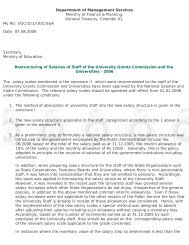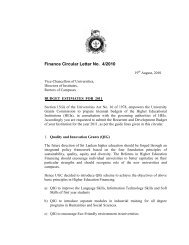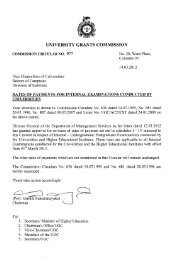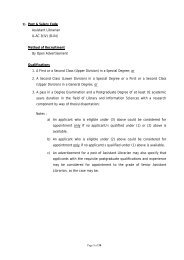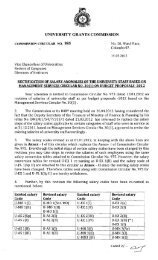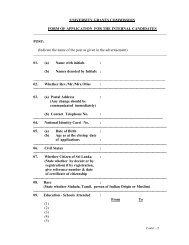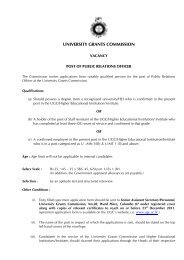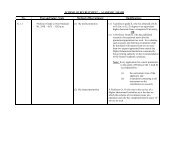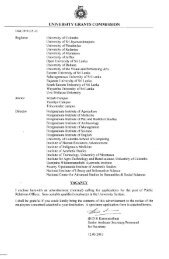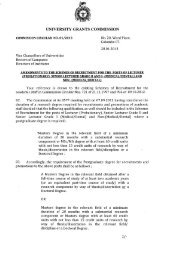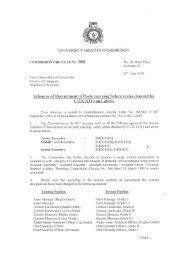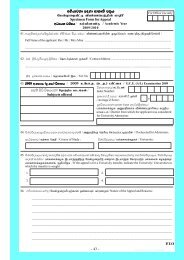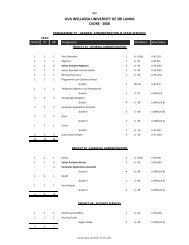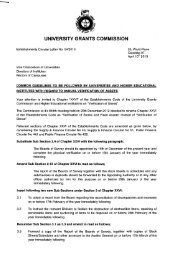UGC Guidelines - Recognition of Institutes.pdf - University Grants ...
UGC Guidelines - Recognition of Institutes.pdf - University Grants ...
UGC Guidelines - Recognition of Institutes.pdf - University Grants ...
You also want an ePaper? Increase the reach of your titles
YUMPU automatically turns print PDFs into web optimized ePapers that Google loves.
GUIDELINES AND APPLICATION<br />
FOR OBTAINING FOR DEGREE AWARDING STATUS FOR<br />
STATE AND NON-STATE HIGHER EDUCATIONAL<br />
INSITUTIONS/INSITUTES AND FOR THE DEGREES TO BE<br />
AWARDED BY INSTITUTIONS/INSITUTES GRANTED DEGREE<br />
AWARDING STATUS<br />
The <strong>University</strong> <strong>Grants</strong> Commission has adopted a two-step procedure and prepared<br />
guidelines for evaluating application for granting Degree Awarding Status for State and<br />
Non-state Higher Educational Institutions/<strong>Institutes</strong> and approval for degrees to be<br />
awarded by such <strong>Institutes</strong>. The Institute which intends to obtain degree awarding status<br />
and <strong>of</strong>fer degree or degrees must prepare two-part application in the form Self-evaluation<br />
Reports (SER) according to the format prescribed herein by the <strong>UGC</strong> and submit along<br />
with required information to the Hon. Minister <strong>of</strong> Higher Education. The Description<br />
given in the relevant section <strong>of</strong> the Self-evaluation Report must make due reference to the<br />
documents/documentary evidences and such documents should be attached with<br />
appropriate labeling as annexes to the SER.<br />
Once applications are received by the <strong>University</strong> <strong>Grants</strong> Commission, the Specified<br />
Authority to evaluate the applications, it will be referred to the Unit handing applications<br />
for degree awarding status (Unit on <strong>Recognition</strong> <strong>of</strong> Degrees & Degree Awarding<br />
Institutions -URDDAI) This Unit will assist the Standing Committee on <strong>Recognition</strong><br />
Degrees & Degree Awarding (S/C on RDDAI).<br />
Upon receipt <strong>of</strong> the application from an applicant/institute, in the form <strong>of</strong> duly perfected<br />
Self-evaluation Reports (Part I <strong>of</strong> the Application perfected in the form <strong>of</strong> Self-evaluation<br />
Report <strong>of</strong> the Institution & Part II <strong>of</strong> the Application perfected in the form <strong>of</strong> Selfevaluation<br />
Report <strong>of</strong> the Degree Programme), the URDDAI will perform an audit on the<br />
set <strong>of</strong> application (s) received to ensure that the applicant/institute submitting the request<br />
has provided all required information. The incomplete application (s) will be returned with<br />
a request for resubmission along with the additional information as may be necessary.<br />
Duly perfected application is forwarded to the Quality Assurance and Accreditation<br />
Council <strong>of</strong> the <strong>UGC</strong> (QAAC) for the desk evaluation. The QAAC will conduct a thorough<br />
appraisal and prepare an evaluation report on the application and submit to the S/C on<br />
RDDAI. The application that has gone the desk evaluation will be tabled at the S/C on<br />
RDDAI will appoint panels <strong>of</strong> reviewers for the QAAC recommended applications; that is<br />
Institutional Review Panel for Part I and Subject Review Panel for Part II <strong>of</strong> the<br />
Application. The Institutional Review Panel will consist <strong>of</strong> specialists on institutional<br />
review, nominees from Specified Pr<strong>of</strong>essional Bodies, as the case may be for an institute<br />
<strong>of</strong>fering pr<strong>of</strong>essional degrees, Director <strong>of</strong> QAAC and <strong>UGC</strong> Officers. The Subject Review<br />
Panel will consist <strong>of</strong> subject matter specialists, nominees from Specified Pr<strong>of</strong>essional<br />
Bodies, as the case may be for pr<strong>of</strong>essional degrees, Director <strong>of</strong> QAAC and <strong>UGC</strong><br />
Officers. The panels will make one or more site visits and verify the information provided<br />
by the applicant/institute and inspect physically all the facilities available, and other
essential components as specified in the guidelines against the Checklist provided by the<br />
<strong>UGC</strong>. The reports <strong>of</strong> the Institutional Review Panel (on Part I) and the Subject Review<br />
Panel (Part II) will be reviewed by the S/C on RDDAI and the report <strong>of</strong> the S/C on<br />
RDDAI will then be forwarded to the Commission for consideration. The Commission<br />
will inform the Hon. Minister about the outcome and its recommendations for necessary<br />
action.<br />
It must be emphasized that the approval by the <strong>UGC</strong> and the Ministry <strong>of</strong> Higher Education<br />
for the degree awarding status and for the pr<strong>of</strong>essional study programme does not<br />
automatically grant the registration for graduates <strong>of</strong> such programmes to practice the<br />
pr<strong>of</strong>ession in the country. Therefore, it must be emphasized that the State / Non-State<br />
Higher Educational Institutions/<strong>Institutes</strong> which have been granted degree awarding status<br />
which <strong>of</strong>fer pr<strong>of</strong>essional study programmes leading to degrees such as Medical,<br />
Engineering, Architecture and other pr<strong>of</strong>essional degrees must seek the compliance<br />
certification from the respective Specified Pr<strong>of</strong>essional Bodies. Hence, they may be<br />
required to submit their study programmes for periodic review by the specified<br />
pr<strong>of</strong>essional bodies who are vested with the powers by Acts <strong>of</strong> Parliaments for<br />
maintaining standards <strong>of</strong> the respective pr<strong>of</strong>essional degree programmes/ pr<strong>of</strong>essions and<br />
issue registration to practice.<br />
Part I: Application for seeking approval for Degree Awarding Status to<br />
State or Non-state Higher Educational Institutions/<strong>Institutes</strong><br />
Evaluation is aimed at examining the capacity <strong>of</strong> the institution in terms <strong>of</strong> degree <strong>of</strong><br />
fulfillment <strong>of</strong> the standards prescribed for 6 components, namely i) governance, ii)<br />
management, iii) financial viability, iv) physical resources, v) academic planning and<br />
development process and quality assurance procedures and vi) competencies <strong>of</strong> academic,<br />
pr<strong>of</strong>essional and technical staff.<br />
The list <strong>of</strong> components and evidences that should be provided along with the application<br />
are given below. The information shall be provided in the form <strong>of</strong> SER and the format for<br />
SER is given in the Annex I.<br />
1. Governance<br />
There should be a governance structure with clearly defined hierarchy such as Board <strong>of</strong><br />
Governors or Board <strong>of</strong> Management, Academic Syndicate (or Senate), Faculty Boards,<br />
Academic Departments, and Centers/Units. The composition and functions <strong>of</strong> such<br />
instruments must be clearly defined. Moreover, the roles and responsibilities <strong>of</strong> relevant<br />
<strong>of</strong>ficials involved (i.e. Chief Executive Officer, Deans, Heads <strong>of</strong> Departments, Registrar,<br />
Bursar, etc.) accountable for administrative, academic and financial matters should be<br />
identified and clearly stated.
Evidence/Information Required<br />
i) Government approval for the enterprise/company<br />
ii) Company Ordinance and By-laws<br />
iii) Governance structure<br />
iv) Registration <strong>of</strong> BOI/Registrar <strong>of</strong> Companies<br />
v) Strategic/Corporate Plans<br />
vi) Handbook <strong>of</strong> the Institution/Institute<br />
vii) Official Website <strong>of</strong> the Institution/Institute<br />
viii) Organogram <strong>of</strong> the Institution and functions/duties and responsibilities <strong>of</strong><br />
divisions and higher <strong>of</strong>ficers<br />
ix) Pr<strong>of</strong>iles and Memberships <strong>of</strong> Governing/Academic Boards<br />
x) Minutes <strong>of</strong> Governing/Academic Board Meetings (during the site visit)<br />
2. Management<br />
The management <strong>of</strong> a Degree Awarding Institution should be carried out through the<br />
guidance <strong>of</strong> standing committees and management procedures appointed by the Governing<br />
Council/Board <strong>of</strong> Management. Such instruments should address all issues related to<br />
general administration, academic administration, financial management, and disciplinary<br />
and welfare matters.<br />
Evidence/Information Required<br />
i) Documented administrative procedures for general administration<br />
ii) Recruitment and promotion <strong>of</strong> the staff and disciplinary procedures<br />
iii) Organizational charts and functions divisions and duties <strong>of</strong> higher <strong>of</strong>ficers<br />
iv) Qualifications <strong>of</strong> administrative staff and service conditions and entitlements<br />
v) Internal and external auditing mechanisms<br />
vi) Annual Reports <strong>of</strong> Institution/Institute<br />
3. Financial Viability<br />
The Institution/Institute must clearly demonstrate its financial capacity and viability.<br />
Further, it must provide assurance and place sureties in place to face contingencies /<br />
emergencies and meet the compensations for students and employees if the institution<br />
faced with suspension <strong>of</strong> its operation and activities.<br />
Evidence/Information Required<br />
i) For established institution - Annual Audited Financial Statement – past 5 years<br />
ii) Newly established institutions – Assets and Liability Statement<br />
iii) Bank Balances past 3 years certified by the Banks<br />
iv) Five year financial forecast - for next 5 years<br />
v) Registration certificates - from BOI/Registrar <strong>of</strong> Companies<br />
vi) Company Directors Annual Declarations to the Registrar <strong>of</strong> Companies<br />
(evidences must be provided during site visit)<br />
4. Physical Resources
The institution must have established all physical facilities required to operate as a higher<br />
educational institution. The institution must have administrative complex and facilities for<br />
educational activities. These includes administrative complex/building, lecture rooms,<br />
auditorium, student teaching and training laboratories, library, computer facility, sports<br />
and recreational facilities, cafeteria and rest rooms, and in the case <strong>of</strong> pr<strong>of</strong>essional courses,<br />
the institution must have its own training facility/hospital or have access to a suitable<br />
teaching facility/hospital, as the case may be. If the training facility/hospital is a<br />
government concern, that partnership shall have been formalized through Memorandum <strong>of</strong><br />
Understanding and operationalized through Agreements.<br />
Evidence/Information Required<br />
i) Physical facilities available for administration and academic faculties/units –<br />
lecture theaters, tutorial rooms, laboratories for practical classes, and facilities<br />
for clinical/in-plant training<br />
ii) Common amenities such as library, computer centre/unit, gymnasiaum and<br />
recreational facilities, cafeteria, rest rooms, etc.<br />
iii)<br />
iv)<br />
Infrastructure Master Plan <strong>of</strong> the Institution<br />
Memoranda <strong>of</strong> understanding and agreements with partner institution (i.e.<br />
Teaching Hospitals /Training Institutions)<br />
5. Academic Planning and Development and Process and Quality Assurance System<br />
The institution/institute shall clearly demonstrate its capacity to plan and conduct<br />
academic training programme that would meet the standards and quality assurance criteria<br />
defined by the Quality Assurance Accreditation Council <strong>of</strong> the <strong>University</strong> <strong>Grants</strong><br />
Commission. This includes availability <strong>of</strong> qualified academic and technical staff for<br />
academic development and planning, teaching/training material development, and conduct<br />
educational programmes and examination and institutional arrangement for internal and<br />
external quality assurance mechanisms and procedures.<br />
Evidence/Information Required<br />
i) List <strong>of</strong> Academic Study Programmes currently <strong>of</strong>fered<br />
ii) Prospectuses/ Handbooks/Brochures giving details on academic study<br />
programmes<br />
iii) Credit and Qualification Framework <strong>of</strong> academic study programmes<br />
iv) Qualification Descriptors <strong>of</strong> individual academic study programmes<br />
v) Subject Benchmark Statements <strong>of</strong> academic study programmes<br />
vi) Details <strong>of</strong> contents <strong>of</strong> courses /modules<br />
vii) Internal and External Quality Framework and Procedures,<br />
viii) Codes <strong>of</strong> Practice<br />
ix) Human Resource Development Plan
6. Academic and Research Competencies <strong>of</strong> Staff (overall)<br />
The Institution shall have minimum number <strong>of</strong> academic staff on permanent basis or on<br />
long-term contracts. The academic staff must possess basic and post-graduate<br />
qualifications from recognized Universities in the relevant field together with sufficient<br />
teaching experience. The staff should also posses. They also should have gone through<br />
suitable staff development programmes to orient them towards teaching in a higher<br />
educational institution. Moreover, the academic staff should possess competencies and<br />
demonstrate continues engagement in research and development.<br />
Evidence/Information Required<br />
i) Academic and non-academic cadre positions<br />
ii) Academic /pr<strong>of</strong>essional qualifications <strong>of</strong> the staff<br />
iii) Staff development programme /continuing pr<strong>of</strong>essional development<br />
programme <strong>of</strong>fered/arranged for the staff<br />
iv) Staff/student ratio<br />
v) Institutional arrangements in place to promote research and development –<br />
such as Research Committees, Research Forums, Journal Clubs, etc.<br />
vi) Evidence <strong>of</strong> interaction with staff and Industry,<br />
vii) Database <strong>of</strong> research and research publications<br />
viii) Annual Reports <strong>of</strong> the Institution<br />
Part II: Application for seeking approval to <strong>of</strong>fer Degrees to be<br />
awarded by an Institute which has passed the Institutional<br />
Review stage<br />
Part II <strong>of</strong> the Application deals with components and evidences required for assessing the<br />
capacity <strong>of</strong> the institution in terms <strong>of</strong> degree <strong>of</strong> fulfillment <strong>of</strong> the standards prescribed for<br />
6 components, namely i) Admission Criteria and Procedure , ii) Academic Programme, iii)<br />
Standards and Quality Assurance, iv) Academic and Research competencies <strong>of</strong> staff<br />
(specific to the study programme and disciplines), v) Teaching/Training /Hospital<br />
facilities specific to the study programme, and vi) Student Support Services and Welfare<br />
1. Admission Criteria and Procedure<br />
The institution must submit details as regard to entry qualifications for the degree<br />
programme, evaluation criteria and selection procedure. The procedure adopted by the<br />
institution must conform into the minimal entry qualifications adopted by the <strong>UGC</strong> for<br />
deciding eligibility for entry into state universities for undergraduate study programmes.<br />
Further, the selection procedure must be based on principles <strong>of</strong> objective assessment and<br />
transparency.<br />
Evidence/Information Required<br />
i) Admission criteria and evaluation procedure<br />
ii) Pr<strong>of</strong>iles <strong>of</strong> students admitted previously and evaluation procedure and results
iii)<br />
Reports on the progress <strong>of</strong> academic programmes – number applied, number<br />
selected, number retained over the study period, number graduated (over past 5<br />
years)<br />
2. Academic Programme<br />
The academic programmes conducted should have relevance to the national needs. Such<br />
programmes need to be in conformity with the Vision and Mission <strong>of</strong> the Institute and<br />
compatible with the physical and human resources available and experience <strong>of</strong><br />
institution/institute. The study programme must have been developed on sound principles<br />
such as a) qualification descriptors, b) credit and qualification framework, c) intended<br />
learning outcomes <strong>of</strong> courses/modules, d) assessment methods that includes end <strong>of</strong> the<br />
course and continuous assessments, e) student-centered, blended teaching and learning<br />
with good mix <strong>of</strong> conventional and modern ICT-based learning tools.<br />
Evidence/Information Required<br />
i) Study Programme Prospectus/Handbook<br />
ii) Credit and qualification framework<br />
iii) Qualification Descriptors<br />
iv) Intended learning outcomes <strong>of</strong> the programme and individual courses<br />
v) Details <strong>of</strong> contents <strong>of</strong> courses/modules<br />
vi) Teaching and learning methods<br />
vii) Teaching panel – on regular/contract/visiting basis<br />
viii) Laboratory/practical/clinical classes and manuals <strong>of</strong> instructions on individual<br />
laboratory/practicals and clinical sessions<br />
ix) Rules and regulations <strong>of</strong> assessments<br />
x) Examination By-laws<br />
xi) Past question papers and answer scripts (if available)<br />
xii) Results <strong>of</strong> graduating class (over the past 5 years)<br />
3. Standards and Quality Assurance Mechanism and Procedures<br />
The institution must clearly demonstrate the internal and external quality assurance<br />
mechanisms and procedures that are in place. The courses conducted need to be <strong>of</strong> high<br />
standard, meeting national and international standards and conforming to relevant<br />
standards and benchmark statements.<br />
Evidence/Information Required<br />
i) Internal Quality assurance mechanisms and procedures<br />
ii) External quality assurance mechanism and procedures<br />
iii) Subject-bench mark statement(s)<br />
iv) Credit and Qualification Framework<br />
v) Qualification Descriptors<br />
vi) Codes <strong>of</strong> practice for students and staff<br />
vii) Student feed-back and comments through questionnaire<br />
viii) Peer observations<br />
x) Labour market surveys and employer feedback
4. Academic and Research Competencies <strong>of</strong> Staff (specific to the Study Programme<br />
and disciplines)<br />
The staff should have required basic and post-graduate qualifications from recognized<br />
Universities in the relevant field together with sufficient teaching experience. They also<br />
should have gone through suitable staff development programmes to orient them towards<br />
teaching in a higher educational institution. Moreover, the academic staff should possess<br />
competencies and demonstrate continues engagement in research and development.<br />
Evidence/Information Required<br />
i) Academic qualifications <strong>of</strong> the regular and visiting staff<br />
ii) Availability <strong>of</strong> required expertise in the staff<br />
iii) Prescribed recruitment criteria and job descriptions <strong>of</strong> academic staff<br />
iv) Staff development Programmes and in-service training programmes<br />
v) Databases <strong>of</strong> on-going research<br />
vi) Database on research publications by the staff<br />
vii) Interactions with the industry and methods <strong>of</strong> research information<br />
dissemination<br />
5. Teaching/Training Facilities Specific to Study Programme<br />
The institution must have established all physical facilities required to <strong>of</strong>fer the specific<br />
degree programme. The faculty/unit that <strong>of</strong>fers the degree programme must have<br />
administrative complex, and facilities for educational activities. These includes<br />
administrative complex/building, lecture rooms, auditorium, student teaching and training<br />
laboratories, library, computer facility, and also should have access to common amenities<br />
sports and recreational facilities, cafeteria and rest rooms. In the case <strong>of</strong> pr<strong>of</strong>essional<br />
courses, the institution must have its own training facility/hospital or have access to a<br />
suitable teaching facility/hospital, as the case may be. If the training facility/hospital is a<br />
government concern, that partnership shall have been formalized through Memorandum <strong>of</strong><br />
Understanding and operationalized through Agreements. In the case <strong>of</strong> study programme<br />
in medical sciences, the teaching hospital to which the student have access and provided<br />
with clinical training must conform into the standards stipulated by the Sri Lanka Medical<br />
Council.<br />
Evidence/Information Required<br />
i) Availability <strong>of</strong> laboratories/clinical training facilities and related facilities for<br />
laboratory work / field work / practicals / clinicals, as applicable to the degree<br />
programme.<br />
ii) Academic support staff and their qualifications and experience<br />
iii)<br />
iv)<br />
Equipment for laboratory work/practical classes/clinical work<br />
In the case <strong>of</strong> pr<strong>of</strong>essional degree programme in medical sciences, the<br />
availability <strong>of</strong> teaching hospital with pr<strong>of</strong>essorial units for clinical<br />
teaching/practice and for gaining experience in advanced clinical / laboratory<br />
techniques
v) Memoranda <strong>of</strong> understanding and agreements with partner institution (i.e.<br />
teaching hospitals/ training institutions)<br />
6. Student Support Services and Welfare<br />
The educational environment should be conducive to make the students as well as the staff<br />
feel comfortable in carrying out the academic activities. The students should be guided<br />
from the day <strong>of</strong> entry into the programme through mechanism such as orientation<br />
prohrammes, academic, academic and student counseling system, career guidance unit.,<br />
etc. There should be mechanisms for students to engage in extra curricular activities. The<br />
staff also should be provided with adequate resources and welfare facilities to enable them<br />
to be motivated to contribute towards improving academic standards <strong>of</strong> the institutions<br />
and voluntarily to guide students for student-centered learning and promote their welfare.<br />
Evidence/Information Required<br />
i) Information on study programme, student support services and facilities in<br />
print and electronic media<br />
ii) Student Prospectus/Handbook<br />
iii) Management information systems and procedures<br />
iv) Teaching/practical/clinical and tutorial schedules<br />
v) Academic guidance and student counseling services<br />
vi) Availability <strong>of</strong> canteens, hostels, library, computer facilities, etc.
APPENDIX<br />
Annex I: Format <strong>of</strong> the Self-evaluation Report for Institutional Review<br />
(Not more than 30 pages excluding annexes)<br />
Executive Summary<br />
Background<br />
Chapter 1:<br />
Chapter 2:<br />
Chapter 3:<br />
Chapter 4:<br />
Chapter 5:<br />
Chapter 6:<br />
Governance<br />
Management<br />
Financial Viability<br />
Physical resources<br />
Academic Planning and Development Process and Quality Assurance<br />
System<br />
Academic and Research Competencies <strong>of</strong> Staff<br />
Appendix<br />
Annex 1.1<br />
Annex 1.2<br />
Annex 1.n<br />
Annex 2.1<br />
Annex 2.2<br />
Annex 2.n<br />
Annex n.1… etc.<br />
Annex II: Format <strong>of</strong> the Self-evaluation Report for Study Programme Review<br />
(Not more than 30 pages excluding annexes)<br />
Executive Summary<br />
Background<br />
Chapter 1:<br />
Chapter 2:<br />
Chapter 3:<br />
Chapter 4:<br />
Chapter 5:<br />
Chapter 6:<br />
Admission Criteria and Procedure<br />
Academic Programme<br />
Standards and Quality Assurance Mechanism and Procedure<br />
Academic and Research Competencies <strong>of</strong> Staff (Specific to the study<br />
programme)<br />
Teaching and Training Facilities Specific to Study Programme<br />
Student Support System and Welfare<br />
Appendix<br />
Annex 1.1<br />
Annex 1.2<br />
Annex 1.n<br />
Annex 2.1<br />
Annex 2.2<br />
Annex 2.n



